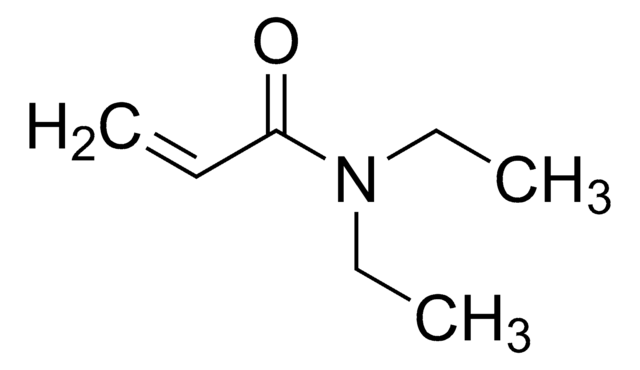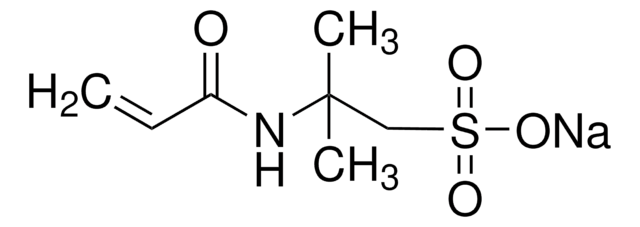448273
4-Acryloylmorpholine
97%, contains 1,000 ppm monomethyl ether hydroquinone as inhibitor
Synonym(s):
1-(Morpholin-4-yl)propenone, 1-Morpholinoprop-2-en-1-one, 4-(1-Oxo-2-propenyl)morpholine, 4-Acryloylmorpholine, Acryloylmorpholine
About This Item
Recommended Products
Assay
97%
contains
1,000 ppm monomethyl ether hydroquinone as inhibitor
refractive index
n20/D 1.512 (lit.)
mp
−35 °C (lit.)
density
1.122 g/mL at 25 °C (lit.)
storage temp.
2-8°C
SMILES string
C=CC(=O)N1CCOCC1
InChI
1S/C7H11NO2/c1-2-7(9)8-3-5-10-6-4-8/h2H,1,3-6H2
InChI key
XLPJNCYCZORXHG-UHFFFAOYSA-N
Related Categories
General description
Application
- To synthesize multiblock copolymers via RAFT polymerization. These functional block copolymers find application in the fields of medicine, energy, and nanotechnology.
- To prepare organogel electrode frame via photopolymerization and cross-linking. This can be used to fabricate triboelectric nanogenerators with excellent transparency, stretchability, and interface adhesion.
- For printing thermoplastic 3D tissue scaffolds. ACMO′s water solubility,and remarkably low viscosity, combined with surface oxygen inhibition, promoteswift liquid flow during high-speed open-air printing.
Signal Word
Danger
Hazard Statements
Precautionary Statements
Hazard Classifications
Acute Tox. 4 Oral - Eye Dam. 1 - Skin Sens. 1 - STOT RE 2 Oral
Storage Class Code
10 - Combustible liquids
WGK
WGK 2
Flash Point(F)
259.7 °F - closed cup
Flash Point(C)
126.5 °C - closed cup
Personal Protective Equipment
Certificates of Analysis (COA)
Search for Certificates of Analysis (COA) by entering the products Lot/Batch Number. Lot and Batch Numbers can be found on a product’s label following the words ‘Lot’ or ‘Batch’.
Already Own This Product?
Find documentation for the products that you have recently purchased in the Document Library.
Customers Also Viewed
Our team of scientists has experience in all areas of research including Life Science, Material Science, Chemical Synthesis, Chromatography, Analytical and many others.
Contact Technical Service















![N-[Tris(hydroxymethyl)methyl]acrylamide contains ≤7% KCl, 93%](/deepweb/assets/sigmaaldrich/product/structures/130/961/5bc6d1a4-a540-4496-9f46-74507af67e21/640/5bc6d1a4-a540-4496-9f46-74507af67e21.png)
